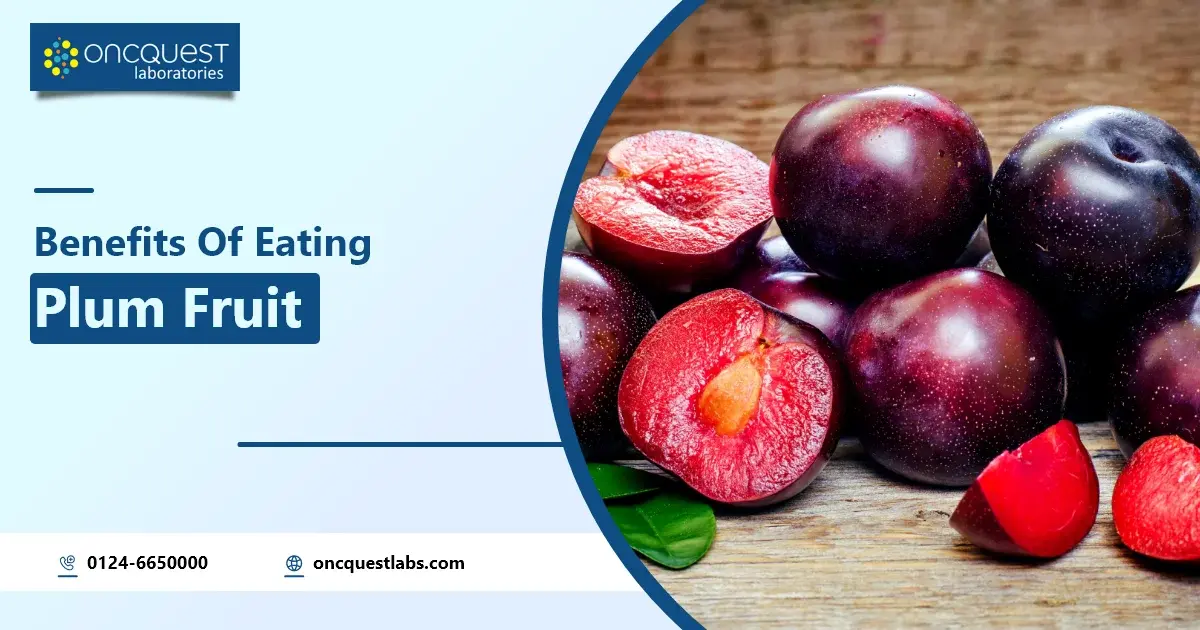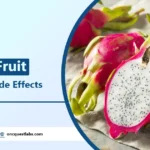Plums are a vibrant and nutritious fruit that offers a delightful combination of sweetness and tartness. Widely enjoyed fresh, dried (as prunes), or even in culinary dishes, plums are packed with essential nutrients and antioxidants. Their impressive nutritional profile includes vitamins, minerals, and dietary fiber, making them a valuable addition to a balanced diet. Beyond their delicious taste, plums provide numerous health benefits, ranging from improved digestive health to enhanced skin vitality. In this article, we’ll delve into the many advantages of consuming plums and discover how this humble fruit can contribute to overall well-being and a healthier lifestyle.
Contents
Nutritional Value of Plums Fruit
Here is a table outlining the nutritional value of plums per 100 grams:
| Nutrient | Amount per 100 grams |
| Calories | 46 kcal |
| Water | 87% |
| Protein | 0.7 grams |
| Total Fat | 0.3 grams |
| Saturated Fat | 0.0 grams |
| Carbohydrates | 11.4 grams |
| Dietary Fiber | 1.4 grams |
| Sugars | 9.9 grams |
| Vitamin C | 9.5 mg |
| Vitamin A | 81 IU |
| Vitamin K | 6.4 µg |
| Potassium | 157 mg |
| Calcium | 6 mg |
| Magnesium | 7 mg |
| Iron | 0.2 mg |
| Phosphorus | 20 mg |
| Sodium | 2 mg |
| Antioxidants | Various (including anthocyanins and polyphenols) |
This table provides a snapshot of the key nutrients found in plums, highlighting their low-calorie content and rich supply of essential vitamins and minerals.
Benefits of Eating Plums Fruit
Rich Source of Antioxidants
Dried plums, or prunes, are an excellent source of antioxidants, including phenolic compounds, flavonoids, and Vitamin C. These antioxidants are crucial for combating oxidative stress caused by free radicals—unstable molecules that can damage cells and contribute to chronic diseases. Phenolic compounds in dried plums help reduce inflammation and protect against cellular damage, supporting overall health and well-being. Vitamin C further enhances antioxidant defenses, boosting the immune system and promoting skin health. By incorporating dried plums into your diet, you benefit from their potent antioxidant properties, which can help protect your body from oxidative stress and support a healthier, more resilient system.
Supports Digestive Health
Dried plums, or prunes, are highly effective in supporting digestive health due to their rich fiber content and natural sorbitol. The dietary fiber in prunes promotes regular bowel movements by adding bulk to the stool and facilitating its passage through the intestines. Sorbitol, a natural sugar alcohol found in prunes, acts as a mild laxative by drawing water into the intestines, which helps soften the stool and prevent constipation. Additionally, prunes contain prebiotics that support a healthy gut microbiome, further enhancing digestive function. Regular consumption of dried plums can help maintain digestive regularity, alleviate constipation, and promote overall gut health.
Promotes Heart Health
Dried plums, or prunes, promote heart health through several beneficial mechanisms. They are rich in potassium, a mineral that helps regulate blood pressure by counteracting the effects of sodium and promoting healthy blood vessel function. Additionally, prunes contain soluble fiber, which aids in lowering cholesterol levels by binding to bile acids and removing them from the body. This process can reduce LDL (bad) cholesterol and support a healthier lipid profile. The antioxidants found in prunes, such as phenolic compounds, also help reduce inflammation and prevent oxidative damage to heart tissues. By incorporating dried plums into your diet, you can support cardiovascular health and reduce the risk of heart disease.
Enhances Bone Health
Dried plums, or prunes, enhance bone health through their rich nutrient profile. They are high in potassium, which helps maintain bone density by counteracting the loss of calcium through urine. Prunes also contain Vitamin K, essential for bone mineralization and the synthesis of proteins that strengthen bones. Additionally, they provide boron, a trace mineral that supports bone health by aiding in the metabolism of calcium, magnesium, and Vitamin D. The antioxidants in prunes, such as phenolic compounds, further contribute by reducing inflammation and oxidative stress, which can negatively affect bone health. Regular consumption of dried plums can support strong, healthy bones and help reduce the risk of osteoporosis.
Aids in Weight Management
Dried plums, or prunes, aid in weight management due to their high fiber content and low calorie density. The dietary fiber in prunes promotes a feeling of fullness, which can help control appetite and reduce overall calorie intake. This satiating effect makes prunes a satisfying snack that can prevent overeating and help maintain a balanced diet. Additionally, the fiber supports healthy digestion by promoting regular bowel movements and preventing constipation. Despite their natural sweetness, prunes have a low energy density, meaning they provide fewer calories per volume, making them a nutritious choice for weight management. Incorporating dried plums into your diet can assist in managing hunger and supporting weight control efforts.
Supports Immune Function
Dried plums, or prunes, support immune function primarily through their high Vitamin C content. Vitamin C is a vital nutrient that boosts the immune system by enhancing the production and function of white blood cells, which are essential for fighting off infections. Additionally, the antioxidants in prunes, such as phenolic compounds, help protect immune cells from oxidative stress and damage. This antioxidant activity supports overall immune health and helps the body respond more effectively to pathogens. By including dried plums in your diet, you can strengthen your immune defenses and contribute to overall well-being.
Improves Skin Health
Dried plums, or prunes, improve skin health through their rich antioxidant content and essential nutrients. They are high in Vitamin C, which is crucial for collagen production—a protein that maintains skin elasticity and reduces wrinkles. The antioxidants in prunes, including phenolic compounds, help protect the skin from oxidative damage caused by free radicals, which can accelerate aging and lead to skin issues. Additionally, the Vitamin A in prunes supports cell turnover and repair, contributing to a healthy, glowing complexion. By incorporating dried plums into your diet, you can benefit from their skin-nourishing properties, promoting a youthful and radiant appearance.
Regulates Blood Sugar Levels
Dried plums, or prunes, help regulate blood sugar levels due to their low glycemic index and high fiber content. The fiber in prunes slows the absorption of sugars into the bloodstream, preventing rapid spikes in blood glucose levels. This gradual release of sugar helps maintain stable blood sugar levels and can be particularly beneficial for individuals managing diabetes. Additionally, the natural sugars in prunes are balanced by their fiber and nutrient content, which supports overall glucose control. Including dried plums in your diet can contribute to better blood sugar regulation and support metabolic health.
Incorporating Plums Fruit into Your Diet
Incorporating plums into your diet is easy and can add a delightful burst of flavor to your meals. Here are some practical ways to enjoy this nutritious fruit:
- Fresh Snacks: Eat plums fresh as a quick, healthy snack. They’re perfect on their own or paired with a handful of nuts for added protein.
- Smoothies: Blend fresh or dried plums into smoothies for natural sweetness and a boost of nutrients. Combine with yogurt, spinach, and other fruits for a refreshing drink.
- Salads: Add sliced or chopped plums to salads for a sweet and tangy flavor. They pair well with greens, nuts, and cheeses.
- Desserts: Use plums in desserts like fruit tarts, crumbles, or cobblers. They add natural sweetness and a burst of flavor to baked goods.
- Cooking and Baking: Incorporate plums into savory dishes, such as glazed meats or stews. They can also be used to make jams, sauces, or chutneys.
- Breakfast: Top your morning oatmeal, yogurt, or cereal with chopped plums for added flavor and nutrients.
Conclusion
Incorporating plums into your diet offers a range of health benefits due to their rich nutritional profile. Whether enjoyed fresh, dried, or cooked, plums provide essential vitamins, minerals, and antioxidants that support overall well-being. From enhancing digestive health and promoting heart health to boosting immune function and improving skin health, the versatile plum is a valuable addition to any diet. By including plums in various meals and snacks, you can take advantage of their health benefits while adding a delicious and refreshing element to your eating routine. Embrace the flavors and nutrients of plums to support a healthier, more balanced lifestyle.





